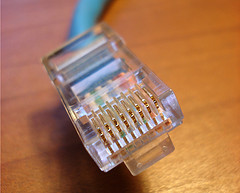Journalism under surveillance
Are you using any encryption tools or doing anything to protect your files, email and contacts on your computer or mobile phone?
As we find out more about the internet surveillance activities of the US National Security Agency, it’s clear that journalists and media organisations are among the targets of intelligence gathering agencies.
“Encrypt everything.”
That was one of the take home messages of Hauke Gierow’s talk on journalism and surveillance at this week’s Social Media Week Berlin.
Gierow heads the internet freedom desk at Reporters Without Borders in Germany. Surveillance he says has a chilling effect on journalism. Your sources become unwilling to talk; there is an erosion of trust in the media; and, people who might be key whistleblowers hesitate to speak out.
Perhaps just as worrying is what he describes as the complicity of technology firms in surveillance – or as Reporters Without Borders refers to them in their 2013 report: “Corporate Enemies of the Internet”.
Gierow says there are some 230 companies worldwide that develop spyware and internet traffic monitoring products that may be used by governments to violate human rights and freedom of information. A number of these firms are within EU countries.
Tools for online security
Here on the onMedia blog you can check out our in-depth series on online security resources and techniques produced by Natalia Karbasova. It’s an ongoing topic onMedia will cover.
But for journalists in developing countries, working safely online can be even more challenging – particularly if they are using shared computers in newsrooms, or in internet cafes. And, some tools may make the net slower to use or be hard to install on shared computers.
So what can you do?
Gierow says to first check out the tools and the how to guides in Tactical Technology Collective’s Security in a Box. These guides are also available in many languages.
He also suggests journalists using shared computers at work should have a dedicated user name and login; try to store their files in encrypted folders; limit the applications you install on the computer to the ones you only need to use; surf the net using the TOR network; and use encrypted chat programs.
Gierow cautions journalists to avoid talking about sensitive information over Skype.( You can also read our interview with Fabian von Keudell from CHIP magazine that examines the security of VoIP services such as Skype.)
You can watch Hauke Gierow’s full presentation below and follow the journalism related links and discussions at Social Media Week Berlin on #smwbjournalim.
UPDATE:
Dutch MEP Marietje Schaake has also drawn attention to the dual use of “digital arms” and wants European lawmakers to take action.
‘It is a bit hypocritical to talk about the NSA revaluations with concern to stress the importance of cyber security, which is also a very popular topic nowadays, without addressing the fact that it’s EU based companies that are making and producing these digital arms.’
Author: Guy Degen






Feedback